by- Samvartha Sahil
It was in the year 2003 that I first met Gauri Lankesh. I was studying at the St. Aloysius College, Mangalore then and Gauri Lankesh had come as the chief guest for a seminar held by our department. Though I hadn’t read much of her writings back then, I was moved by the affectionate way in which she spoke to all of us and impressed with the clarity of thought when she spoke about justice. Our brief interaction that day ended when she wrote on my note book her postal address saying, “Keep in touch.”
Till sometime in 2005 I used to write to Gauri once in a while responding to something that was published in the weekly of which she was the Editor. Gauri responded to some of those letters too. But after 2005 monsoon I got absorbed in my own world and also lost touch with Gauri’s weekly and also Gauri.
One day in 2009 when I was working for The Hindu in Mangalore I got a call while I was filing a story. “Hello Samvartha, this is Gauri Lankesh,” the voice from the other side said. She had called to give me a pat on the back for a story I did after the attack on minorities in Kaup following the Hindu Samajotsava. She wanted to honour those who had saved the lives at an event that was to be held in memory of her father and she asked me for their contact details. The story I did which carried the headline ‘Hindutva People Attacked Us, Hindus Saved Us’ was translated by Gauri and carried as a part of her editorial the following week.
During that noon’s talk there was so much warmth in her voice that I believed she remembered me from my teenage days when I first met her and also wrote to her. But it wasn’t so. It was only in 2014 she realized that I was the same boy who had met her a decade ago and written to her saying the translation of Gulzar and Javed Akthar in the special issue of her weekly was bad. We both had met in Mysore for a seminar on Sufism then. We spent the evening together roaming the streets of Mysore and talking about our movements, literature, journalism, common friends and our own personal lives. When I recollected a letter she had written in response to mine Gauri, that evening, gulped down the sip of whisky in a hurry to say, “Are you the same boy?” When I smiled to answer in the positive Gauri said, “I was not very much home those days with writing in Kannada though I could speak and read quite well in Kannada. So I used to find it slightly difficult to respond to letters after the task of writing an editorial,” and followed it up with anecdotes of her struggle during the early days of Kannada journalism, which made us have good laugh.
Gauri who was working in Delhi with an English media returned to Bangalore when her father, giant of a writer and journalist, P. Lankesh passed away. Those were the early days of 21st century and soon Gauri took over as the editor of the weekly her father used to edit. Until she took charge of Lankesh Patrike as its Editor she did not share a bond with the people’s lives of Karnataka. Moreover she hardly could speak and write in Kannada fluently. The huge fan following that Lankesh and Lankesh Patrike had by then looked at Gauri and her ability to carry forward the legacy of Lankesh and Lankesh Patrike very sceptically. But over the years Gauri surprised all and probably herself too, to become a prominent ‘Activist-Journalist’ (as she liked to refer herself) from Karnataka.
The last 17 years of Gauri’s life spent in Karnataka, Kannada journalism and lives of Kannada people and the transformation Gauri went through in the last 17 years is not just phenomenal and defining of Gauri but also holds the message of her life. Those were the years of becoming of Gauri.
In the year 2000, as said earlier, Gauri could hardly write and speak Kannada fluently. Her editorials of those days and the letters she wrote those days stand as witness to this. She was just a broad liberal humanist, values she imbibed through the living of her father, when she returned to Karnataka. But soon when she became more and more familiar with the lives and issues of Karnataka her politics became sharper and sharper. If her learning Kannada marked the first move of her becoming, after her return to the native, the second major move in her transmogrification came with her being one of the founding member of Karnataka Forum for Communal Harmony (Karnataka Komu Sauharda Vedike) which was started as a response to the communal violence of Gujarat 2002 and the oath taken by the right wingers in Karnataka to make Karnataka another Gujarat. This politics of the right wing escalated with their attempt to make the syncretic Bababudangiri the Ayodhya of the south. This was met with strong resistance by the Karnataka Forum for Communal Harmony where many, including Gauri, were jailed. This movement to preserve the syncretic culture of Bababudangiri shifted gears of the activist life of Gauri and brought her closer to the activist circles in Karnataka and tuned her politics.
Around the same time armed struggles was finding ground in Karnataka and that had disturbed Gauri to a large extent. In 2004 she was one of the journalists who were invited by the Naxalites for a press meet in the western ghat forest. It is during this visit that she met her college senior Saketh Rajan alias Prem alias Saki who was leading the Naxalite movement in Karnataka and also saw the lives of the Naxalites closely. She developed great respect for people who had left all comforts and luxuries of life and come to the forest where they lived under difficult circumstances. Their commitment they had for the values they believed in and the dream they had for the world humbled her. But that did not eclipse her mind and she did see the possible violence that could unfold. She started her work of becoming a mediator between the Naxalites and the Government to arrange for a meeting between the two and resolve the issues. Both the parties agreed but the Government acted prematurely and hunted Saketh in the early days of 2005. Angered by this, Gauri got on to the streets to condemn the Government’s act. This earned her the title Naxalite sympathiser when all she desired was for peace and resolving of issue without arms!
As a continuation of this she along with freedom fighter like HS Doraiswamy started the Citizen’s Initiative for Peace which mediated between the Naxalites and the Government and brought back many a Naxalites to the mainstream. Noor Sridhar being one of the Naxalites who came to the mainstream in an article on Gauri written after her assassination says that the Naxalites have been fonder of Gauri than Gauri being fond of them, as the mass seem to believe or has been made to believe. In the very same article Noor Shridhar says though Gauri associated with the Communists was never a communist, though had sympathies for the Naxalites never endorsed their method and though had immense respect for the Dalits and the Dalit movement was never an Ambedkarite. Continuing his observation he said, in the same article, that Gauri’s solidarity was with values she believed in and she always saw the limitations of the organizations. Probably that is why she was never a member of any organization. Her participation was purely value based and agenda based.
Very recently K. Phaniraj was recollecting how Gauri was not familiar with the divisions within the communists and the several parties that burst out of the Communist Party of India. On learning about over 64 organizations in existence, Phaniraj remembered, Gauri reacted with a, “Whatever.” That, “Whatever,” was not of a dismissive nature but an “I cannot be bothered” in nature.
This ‘not being bothered’ did not mean she did not care. It only meant she did not want to focus on it. Instead focusing on the possibilities of a united force to make the world stand on its legs was important for her. Her solidarity with every movement for justice spoke this nature of her. It was very well reflected in her efforts to bring together the ‘red’ and the ‘blue’. This effort was not a strategic position or move for her but something she believed with all her heart.
During the Chalo Udupi in October 2016, which was the last time I met her face to face, it was decided that only blue flags would be taken during the event. But on the day of the event many organizations which showed solidarity had brought their own flags and I was witness to Gauri politely requesting those organizations with other flags to fold their flags and keep it inside. That showed how in movements Gauri participated not like a leader but like a cadre. It also showed how she had slowly started to absorb Ambedkarite thoughts and was preferring ‘blue’ over ‘red’ though she wanted both these colours to come together as a united force.
Gauri had not read Ambedkar till some years ago. But when she read Ambedkar she let Ambedkarite thoughts to seep into her and she also expressed her regret for not having read Ambedkar for long. Not to say that she was not sensitive to the cause of Dalits prior to this. But her Dalit consciousness had not formed in a strict Ambedkarite sense and was still within the large framework of human rights and civil rights. That started to change around 2013-14 with she starting to read Ambedkar. The birthday gift I received last year from her was the biography of Periyar and that kind of hints the path she was progressing in.
The last time I met Gauri was during Chalo Udupi , as I remembered earlier, in 2016 October. I had then just returned from my visit to Jammu & Kashmir post Burhan Wani assassination for a book project. Gauri was keen on knowing what I had seen and heard. She insisted I take her for a good fish meal and as we drove and later had lunch in a small hotel in Udupi she heard with utmost curiosity the story of my travel. In the end she asked me if I would be ready to go to Kashmir with Shivasunder, a comrade of concern, to do a series of reports for the weekly, Gauri Lankesh Patrike. I immediately agreed. After some weeks when I reminded her about the plan Gauri said, “Shivasunder seems to have other commitments. We both can go together.”
Couple of months later Gauri called me very late in the night. She had just completed reading Basharat Peer’s book Curfewed Nights and had called to thank me for having suggested the book to her. That night I suggested some more books on Kashmir and she made note of them. Her excitement showed how Kashmir issue was not a preoccupation for her until then and slowly was becoming one. That is exactly why she was planning a trip to Kashmir with this young boy.
But by then I had heard from a common friend and a senior activist that demonetization had hit the circulation of Gauri’s weekly and she was in a financial crunch. That information made me realize why the Kashmir plan was not materializing soon and I stopped asking Gauri about it. The financial crunch made he write columns for Bangalore Mirror so that she can earn some money to sustain her tabloid. Eventually her column was stopped. The space for liberal radical was closing down swiftly. Gauri herself spoke of the financial crunch when in August she called to say how a particular article by someone in J&K thrilled her and how badly she wanted to meet the writer. “We can meet when we go there,” I told her. In response, she explained the financial matters saying, “Let me recover a bit and then we can go.”
A month later Gauri was assassinated and the dream of our Kashmir visit also died.
Soon I heard that she had made many a plans earlier which could not materialize soon because of her financial crunch. Ramesh Aroli had translated Gudipati Venkatachalam’s novel ‘maidaanam’ which she was to publish, a new book by Revathi, whose autobiography ‘The Truth About Me- The Story of A Hijra’ was also published in Kannada by Gauri, and a translation of Curfewed Nights which I was to do- all had got delayed because of the way in which demonetization hit Gauri.
When a person like Gauri dies several dreams die and though movements don’t die they feel a jolt and lose some energy. The day following her assassination a protest was held in Udupi, like in many places across the country, where a Dalit activist held me tightly and weeping uncontrollably said, “Now who will care for us? Now who will give space to our issues in media?” Gauri did not believe in becoming the voice of someone else but always made sure she listens to the voice of the people and within her means whatever was possible to amplify that voice, through her tabloid, through her publication etc, she did. Her life coming to an abrupt end shook many, spaces shrunk for many and many felt orphaned.
A week after Gauri’s assassination a huge protest event was held in Bangalore. Revathi whose autobiography Gauri had published and whose next book Gauri was to publish was on the stage representing the community of sexual minorities. Akkai was seen in tears and embracing Gauri’s mother and sister who too were in tears. It was learnt that the community of sexual minorities from Bangalore had actually collected money for the protest event through begging. This showed Gauri’s close association with the sexual minorities which hardly made news.
An interesting article by a Kannada website revealed the backstory of Gauri’s association with the sexual minorities. Sometime during the early days of Gauri’s editorship at Lankesh Patrike a reporter had filed a story on the sexual minorities which was slightly derogatory in nature. A case was filed against the tabloid for the published report. The case was being fought by one B.T. Venkatesh who once took Gauri to meet members of the sexual minority community which became the beginning of her association with the community and becoming a part of their struggles; social and political. Gauri became “akka” (elder sister) to the community. This says that Gauri’s relationship with the sexual minorities was not just as a reporter grounded on a certain kind of political correctness but extended to a personal relationship with them. That is why in Bangalore on 12 Sep the stigmatized, excluded and abandoned community cried loudly, “I am Gauri.”
In the last seventeen years of her life Gauri became a lady of movements, as a journalist, through her active participation in different movements for rights and justice. This was a long journey from where she began in 2000 as a person of broad liberal humanistic values. She herself, for sure, was aware of the change she had undergone- of becoming an activist, learning Kannada, internalizing Ambedkarite thoughts, developing sensitivity towards with sexual minorities, coming to understand the Naxalite struggle, arriving at a solution for the Naxalite problem, working towards understanding the Kashmir struggle etc. Probably her own life taught her the possibility of the change human heart and intellect can go when it faces reality and truth. May be that was the reason for her immense faith in dialogue. Even when she was trolled on social media by people half her age and younger than that, she engaged with them, dialogued with them. In all possibilities it is her own becoming of what she became in her 17 years of life that she could invest faith in the possibility of those ‘misguided children’ of hers (as she called those trolls who wished her death) becoming a better, socially sensitive and politically conscious human. At the same time through her becoming she gave us the message of her life i.e. the possibility of change in humans and in society through humans.
It must also be said that Gauri is what the times in which she lived made out of her. The pressure of history was such that Gauri became Gauri. But it is not the call of the times which alone makes a historic figure like Gauri but also the way in which they respond to the times. As much as Gauri was shaped by the times, the times she lived also got shaped by Gauri.
Gauri emotionally adopted Kanhaiyya, Jignesh Mevani and Umair as her sons. To think about it one is a boy with communist influence, another an Ambedkaraite. When Gauri passed away Sheila Rasheed, a Kashmiri girl, on record referred to her as ‘Amma’ (mother). That kind of symbolizes the various streams of thoughts that capped within her.
When Gauri would refer to all these young ones of my generation as sons, at times I (later I learnt many did the same) would playfully ask her why wouldn’t she adopt as her son and notoriously ask for T-Shirts when she bought one for one of the three. Gauri would know that we were pulling her leg and would respond saying, “You have been adopted by me long ago. These are new ones.” It was not an intelligent answer to our notorious remarks but an honest answer. She actually had always treated me and many like her own children.
I can never forget how once she called me to ask how I was doing after she discovered (through my couplets posted on social media) that I had parted ways with someone I love and was saddened by it. She consoled me like a friend and like a friend asked me to not spend much time over lost love because that would eat up the time I can dedicate to find new love. The concern was genuine and each word spoken was honest. Few months before her assassination I had messaged her about the fellowship I had received to make a film on mental health and that night, late night, she had called me to discuss what her thoughts around mental health, depression to be specific, were and to suggest what possibilities can be explored.
I am recollecting some of these very personal matters just to say that Gauri saw me and many like me not just as comrades of concern but as fellow humans, as friends, who meant a lot to her beyond social political movements, thoughts and idea that we shared etc. She cared for all humans she was associated with. There was immense truth in her concern for her fellow beings.
Gauri was like a mother, friend and guide all at the same time.
Gauri would publish some of the poems I used to translate in her weekly and tell me after the week’s edition would be out. Once when I told her she had to take permission in advance before publishing them she laughed loud asking me to repeat myself. I felt so embarrassed that I shut my mouth first and then opened it only to join her in laughing. She would publish my translations without my permission because she believed that among friends it is okay to take such liberties.
Once Gauri called me an hour before the weekly was to go for print asking me to translate a poem “asap.” It was the poem by Hussain Haidry which had gone viral. I was at an ice cream parlour with a friend at that point of time. I ended up translating the poem on a tissue paper. After half an hour when I called her she typed down the translation as I read it out. Immediately then she said, “now listen” and read out her translation of Abul Kalam Azad’s poem which he had written as a response to Hussain Haidry’s poem. She was to carry both the poems in her coming issue which was to go for print in the next few minutes. Though Abul’s poem appeared to counter the poem of Hussain at one level, to Gauri they were complementing poems. More over even if it was countering she would still carry it because Gauri always had space for dissent.
Once when I had argued with Gauri saying the abandonment of a fellow activist from the organization for a wrong he did was not acceptable to me because I believe excommunication is a very brahminical idea. Guess she hadn’t given much thought about it and when I uttered my feelings she immediately said, “Yes, you are right. I will see what can be done,” and told me she would speak to the excommunicated activist since she also felt that all he needed was some talking and making him realize his mistake. There was no space for abandoning and excommunicating in her world. My former colleague and friend Sudipto in a piece had remembered how he once opposed Gauri on ideological grounds and thought that would end his ties with her but was only surprised when she spoke to him with the same affection next time and introduced him to a friend as, “son.”
Gauri believed in and lived what Makhdoom wrote as, “hayaat leke chalo kaayenaat leke chalo, chalo toh saarey zamaaney ko saath leke chalo.”
That night in Mysore when Gauri and I had the longest conversation ever, she had asked me if I had read her mother’s autobiography. I had answered in the negative and Gauri promised to send me the book so that I could read it. But Gauri forgot to send the book. I later read the book as a jury member for the annual book award given by the Karnataka Sahitya Akademi, since it was one of the book contesting for the award. I was thrilled reading the book by Indira Lankesh. After reading it, I called Gauri and she asked me what I thought it. The outstanding book chronicles the coming of age of both Lankesh and Indira. In my reading of the book I saw how the coming of age of a man is more than often individualistic and personal success/ achievement oriented while the coming of age of a woman is more than often a collective growth and the success is measured through the contribution made to others lives. Gauri had liked my reading of the book. In this conversation around her mother’s book I had told Gauri that she should write her autobiography because that would give us a third dimension to the life of her father. She had dismissed the idea. Had she written would it give us a third dimension to the life of Lankesh, I don’t know. But I am sure it would still be a story of coming of age where growth is collective and life, cooperative.
Gauri would have turned 58 today had she been alive. I weep in silence as I remember her and write this.
Rest in power, Gauri!
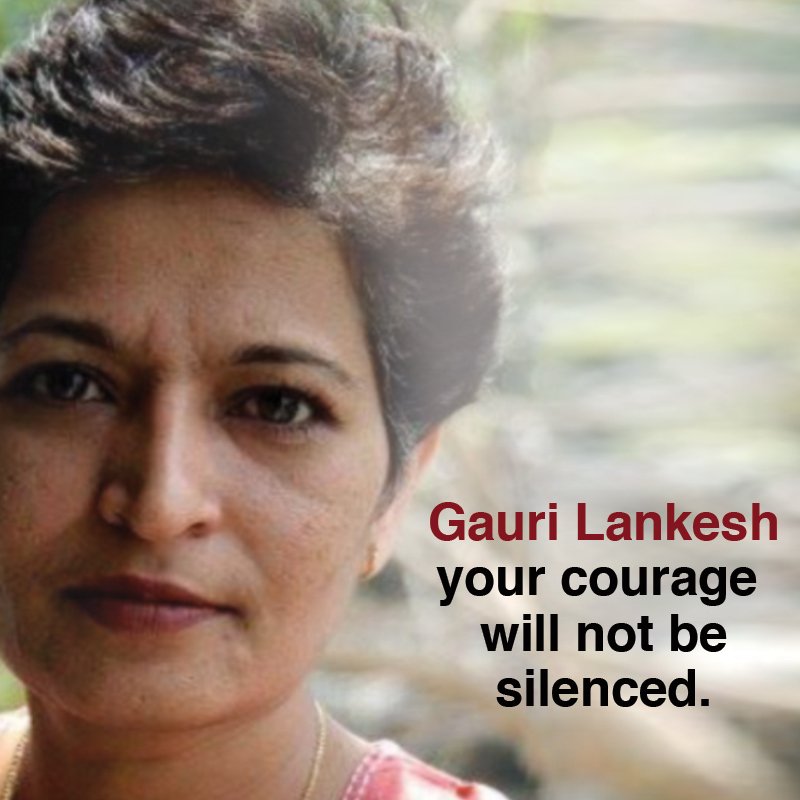
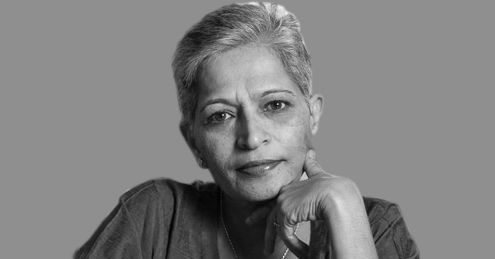
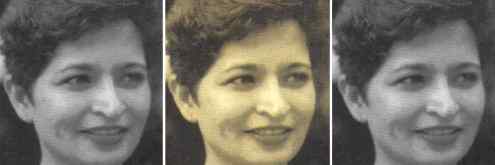
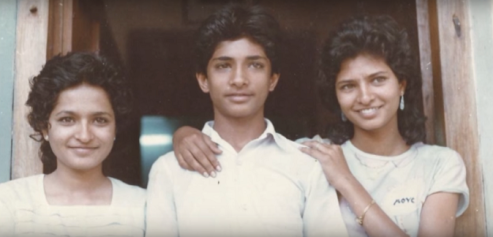

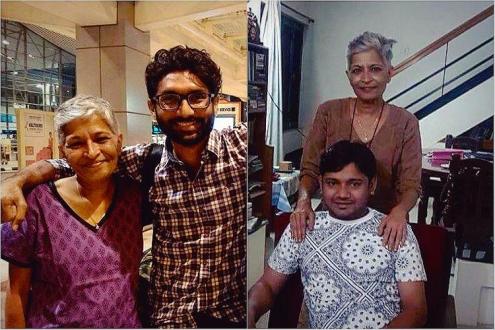
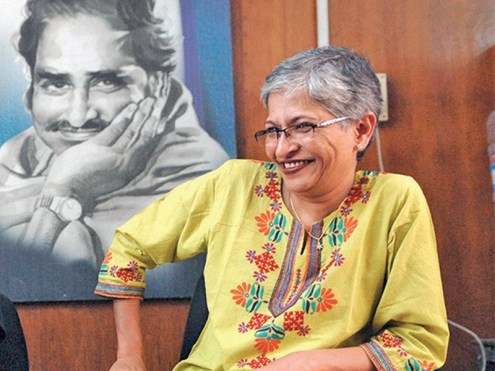
January 30, 2020 at 9:42 pm
The courage of Gauri will continue to inspire many generations and her life and works would give many knowledge and optimism